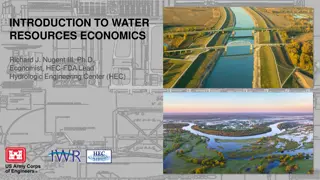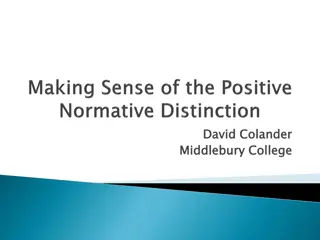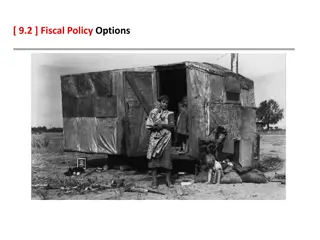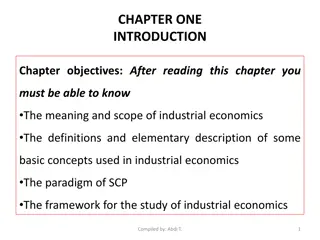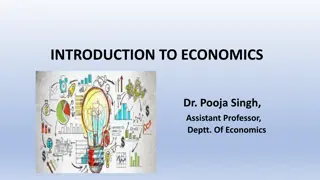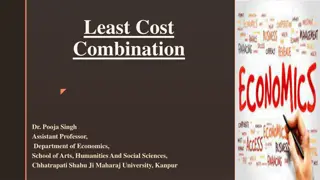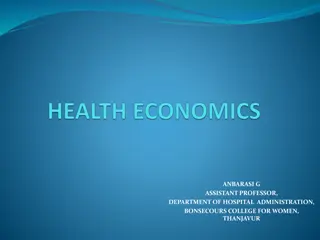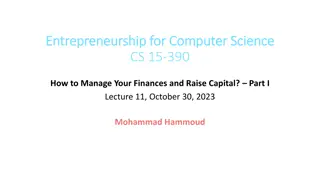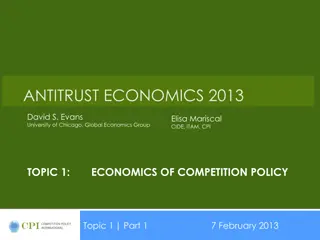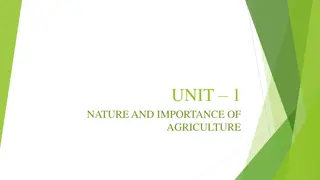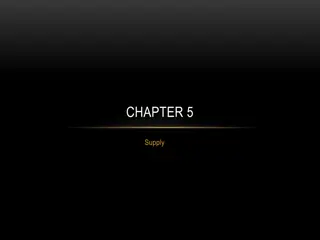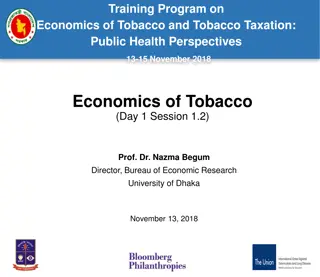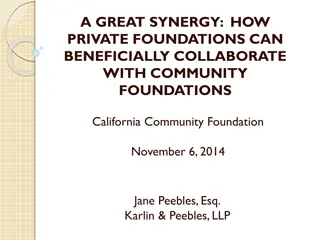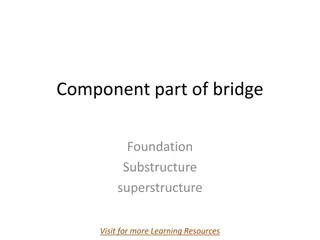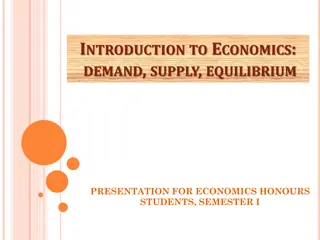Understanding Economics: Foundations and Concepts
Explore the core principles of economics, including scarcity, incentives, trade-offs, opportunity costs, and marginal thinking. Discover how these concepts shape individual decisions, market dynamics, and overall economic behavior. Learn about microeconomics and macroeconomics, and how they provide insights into the workings of economies at different scales.
Download Presentation

Please find below an Image/Link to download the presentation.
The content on the website is provided AS IS for your information and personal use only. It may not be sold, licensed, or shared on other websites without obtaining consent from the author. Download presentation by click this link. If you encounter any issues during the download, it is possible that the publisher has removed the file from their server.
E N D
Presentation Transcript
1 The Five Foundations of Economics
Big Questions 1. What is economics? 2. What are the five foundations of economics?
Purpose of This Course Provide you with the tools to Discover how the world works Be an informed citizen Live your life to the fullest Understand markets Make better personal decisions
What Is Economics? Scarcity The limited nature of society s resources given society s unlimited wants Economics The study of how people allocate their limited resources to satisfy their unlimited wants The study of how people make decisions
Practice What You Know1 What can be said about scarcity? A. Scarcity forces us to make choices. B. Scarcity doesn t affect the super-wealthy. C. Scarcity only affects commodities such as oil. D. Scarcity generally doesn t affect our day- to-day living.
Microeconomics and Macroeconomics Microeconomics The study of individual units that make up the economy Focus on individuals, businesses, industries Macroeconomics The study of the overall aspects and workings of an economy Focus on big picture
The Five Foundations of Economics 2 1. Incentives matter 2. Life is about trade-offs 3. Opportunity costs 4. Marginal thinking 5. Trade creates value
Incentives Matter1 Incentives Factors that motivate you to act or exert effort People respond to incentives!
Incentives Matter2 Positive incentives Encourage action by offering rewards or payments Negative incentives Discourage action by providing undesirable consequences or punishments
Incentives Matter3 Direct incentive Here is what I want you to do, and here is what I am going to do in order to get you to do it. Generally easy to recognize Indirect incentive A secondary change in behavior brought on by the original incentive More difficult to recognize
Practice What You Know2 Which of the following situations illustrates an incentive? A. Dave snacks all afternoon and isn t hungry for dinner. B. Dirk s children misbehave during dinner. C. Lee gives his children candy if they behave during dinner. D. Jaime goes to a restaurant for dinner.
Life Is About Trade-offs Scarcity implies choice Scarcity Choice Every decision incurs a cost To have one thing, you have to give up another thing
Practice What You Know3 The governor decides to increase funding for education. However, this will mean decreasing funding for infrastructure. This situation illustrates A. trade-offs. B. comparative advantage. C. incentives. D. markets.
Opportunity Cost1 Opportunity Cost The highest-valued alternative that must be sacrificed to get something else Not all alternatives just the next-best choice Scarcity Choice Opportunity Cost
Opportunity Cost2 What is the opportunity cost of attending college? Tuition and fees Books Earnings from full-time work What about room and board?
Practice What You Know4 The opportunity cost of buying a good is A. the sum of values of all the other goods you could have purchased. B. the value of the next-best alternative you could have purchased. C. irrelevant since you will purchase your highest- valued good. D. the average of values of all the other goods you could have purchased.
Marginal Thinking1 Economic thinking Requires a purposeful evaluation of available opportunities to make the best decision possible Marginal thinking Requires decision-makers to evaluate whether the benefit of one more unit of something is greater than the cost
Marginal Thinking2 Suppose you are vacuuming your living room. Will you move the couch and china cabinet to vacuum under them? Marginal benefit Small additional amount of carpet is cleaned Marginal cost Much more time and effort
Practice What You Know5 With regards to marginal thinking, an individual will do an action if A. the probability of success is greater than 50 percent. B. the action has positive benefits. C. the costs of the action are small. D. marginal benefits marginal costs.
Trade Creates Value1 Markets Bring buyers and sellers together to exchange goods and services Trade The voluntary exchange of goods and services between two or more parties
The Circular Flow1 Circular Flow Shows how resources and final goods and services flow through the economy Resource market Product market
The Circular Flow3 Barter Individuals trading a good or service in exchange for something they want Double coincidence of wants Occurs when each party in an exchange transaction has what the other person desires
Trade Creates Value2 Without trade, you would have to produce everything you consume. Trade fosters exchange of goods and promotes specialization. Comparative advantage The situation in which an individual, business, or country can produce at a lower opportunity cost than a competitor
Conclusion Economists ask, and answer, big questions about life. This is what makes the study of economics so fascinating. Economics is the study of how people allocate their limited resources to satisfy nearly unlimited wants. The five foundations of economics: 1. Incentives 2. Trade-offs 3. Opportunity cost 4. Marginal thinking 5. Trade creates value




